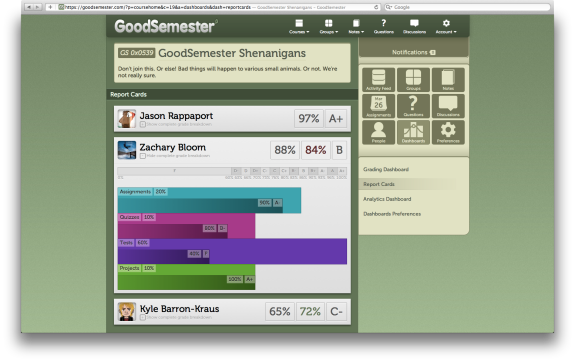You have /5 articles left.
Sign up for a free account or log in.
Woe to the education startup that wanted to get any press coverage yesterday, during a day when both educators and technologists were all a-twitter about the stream of surprising news out of Blackboard HQ. (see Inside Higher Ed's coverage). And woe, in particular, if that startup is building something that falls -- even loosely -- into the LMS category.
Of course, GoodSemester's Jason Rappaport insists that his startup isn't an LMS. It's solving a different problem, for starters. And even if a side-effect is something that solves the LMS problem (that is, both the problems LMSes claim to solve and the problems with LMSes), GoodSemester offers a very different way of thinking about working and learning online.
I spoke with Rappaport yesterday and had a demo of GoodSemester, which launched its public beta earlier this month. Needless to say, after all of yesterday's Blackboard hullaballoo, I told him I'd hold off posting this story 'til today. He laughed -- rather fearlessly I'd say. It's something that Michael Feldstein noted too when he wrote about GoodSemester recently: "Jason is just bursting with ideas that he wants to tell you about. He uses a lot of superlatives. This feature is the 'first on the planet.' That one is 'revolutionary.' That’s not just youthful exuberance (although it is that too). Jason takes pride in re-imagining."
Of course, re-imagining the LMS is something that a lot of new education startups claim to be doing. Many of them have traded the UI of a traditional-looking portal for the news feed of Facebook, but as Rappaport boasts proudly, he isn't just copying that social media look and feel and functionality for GoodSemester. The closest comparison might be "Basecamp" -- that is, a set of collaboration and productivity tools designed for education. Or perhaps Evernote. Or maybe Dropbox. Or Google Docs. (And like Evernote and Dropbox, GoodSemester offers a fermium service where you upgrade depending on your usage.) No doubt, many people already cobble together these various products in their own learning toolbox. GoodSemester aims to be the multitool, if you will. The one tool you need to do all those things and more.
The most basic question the product answers, says Rappaport is "why do I bring a computer to class?" It's to read class materials, to take and share notes, and to "make content." The note-taking and note-sharing aspect has garnered the startup quite a bit of interest, and it recently announced a partnership with the 20 Million Minds Foundation to populate it with openly-licensed content from textbooks -- that content can in turn be copied, annotated, and shared. The default setting on the platform is CC-BY-SA and so "remixing is built in," says Rappaport, and while you can keep your own notes private should you choose, it's easy to access the "Global Notes" feature and find content from other learners.

It's the GoodSemester grading system that piqued Michael Feldstein's interest when he reviewed the product. No doubt, it's slick, making it incredibly easy to adjust curves and cutoffs for grades without having to "do the math" -- you simply drag the curve or the grade-span. The site is Ajax-powered and all the data, posts, and visualizations update in real-time.

Those two features -- note-taking and grading -- might indicate some level of confusion about who exactly this product is designed for: is it professors or is it students? Indeed, there's no distinction in GoodSemester between the views and features if you're a professor or student (the exception: if you're the creator of the course, you have the option to delete it). That highlights just one of the ways in which Rappaport is rethinking platforms for learning online. In other words, this isn't about reconstructing offline roles in online settings. Rather it's a nod to the interest in more people offering "courses" online, whether they're part of educational institutions online or not.
Rappaport has a really big vision for GoodSemester, which remains at the moment entirely bootstrapped. He's graduating from college a year early and using the money his mom had set aside for tuition to fund his company.

